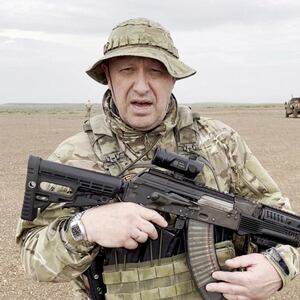The highly likely death of Yevgeny Priogozhin—the result of an assassination plot, most likely a bomb aboard the plane he was traveling on, US officials told the Wall Street Journal—is the latest event on the path to a post-Putin Russia. Putin entered the last phase of his political life when he launched the full-scale invasion of Ukraine in February 2022.
The invasion was doomed because of his hubris, his grandiose neo-imperialism fed by yes-men intelligence and military officers who let him believe (and perhaps believed themselves) that there would be victory for Russia in such an ill-conceived murderous political-military operation.
It was also doomed because of the rotten corruption eating away at Russian government and society, among other things underfunding and warping Russia’s military modernization.
As Russia’s military setbacks piled up, Putin turned to Prigozhin—a man he had already trusted with his most risky operations. It is worth remembering that it was Prigozhin’s company, blandly named the Internet Research Agency (belying its revolutionary intent) that spearheaded the social media component of Putin’s unprecedented direct attack on U.S. elections in 2016.
Putin entrusted Prigozhin with this most sensitive operation, one that Putin undoubtedly regarded as revenge on President Obama and the U.S. government for what he regarded as U.S. meddling in Ukraine’s domestic politics in 2014. Putin blamed the U.S. government for his loss of control in Ukraine—the demonstrations in 2014 that led to a transition government, the fleeing of his man former President Viktor Yanukovich from Kiev, and ultimately elections and a new democratic, westward-leaning Ukraine.
Prigozhin’s operations against the United States delivered—Russian disinformation about Hillary Clinton‘s health and attitude towards Black Americans, active encouragement of separatist sentiment in Texas and California and messaging to increase political polarization in America, all undoubtedly had an impact on the 2016 elections and the American political ecosphere. And so those operations—with financial funding from the Russian government—continued until Prigozhin’s mutiny.
In Ukraine, Prigozhin also delivered, albeit in a limited tactical fashion. His Wagner mercenaries out-performed Russia’s regular military forces and with Prigozhin communicating via social media from the battlefield he provided a rallying point for nationalists supporting Putin’s war effort.
He embarrassed the military and defense establishment with his success and exacerbated a rivalry that was already brewing between himself and Putin’s Minister of Defense Sergey Shoghu and chief of the armed forces General Valery Gerasimov. Prigozhin appears to have recruited supporters from among that establishment—perhaps providing kickbacks and other benefits to reported members of the Wagner “VIP Club.” Notable among those members, as reported by CNN, was General Surovikin, also known as “General Armageddon” because of his brutal campaigns in Chechnya and Syria deliberately targeting civilians and leveling cities and towns.
Prigozhin’s anger at Putin’s war leaders culminated in his mutinous march on Moscow two months from the exact day his private plane fell from the sky in what appears to have been an assassination of him and his top deputy, Dimitry Utkin, the reported founder of the Wagner force.
The public challenge to Putin’s authority—Prigozhin’s unimpeded march from Ukraine through the southern Russian military town of Rostov-on-Don up to the outskirts of the capital city—was the next marker in the road to Putin’s political demise. Putin’s failure to predict, prevent and at least for a while, punish this act revealed his political weakness to the world.
But the moment Putin declared Prigozhin’s act “traitorous” and a “stab in the back,” the clock was ticking. Prigozhin was a marked man, like other traitors before him, former intelligence agents, Alexander Litvenyenko, and Sergey Skripal, but he was also different. He was likely deeply intertwined with Russian elites and was popular with nationalists. Based on the crowd in Rostov cheering him on, Prigozhin also likely enjoyed support among the regular military and the Russian people. Putin had to try to assess the likely nationalist and public response to any moves against him, including murder.
Meanwhile, the Wagner group could also continue to be useful to the Kremlin, especially in Africa and the Middle East, so the Kremlin would need time to consider a leadership transition. Not last of all, Putin had to figure out who supported and perhaps helped Prigozhin in his mutiny. All of this likely explains the delayed retribution.
Assuming Putin directed action against Prigozhin and his top deputies, he did so at a new moment of weakness for him on the international stage. This week he was barred from attending the BRICS summit in person, because of an outstanding International Criminal Court (ICC) warrant for his arrest for human rights violations (abducting Ukrainian children), and Russia’s first attempt in fifty years to land a probe on the moon had also crashed (if not burned) this week. The Wagner mercenary organization has been decapitated and retribution has been public and is at least for Russian officialdom, verifiable.
But this assassination is likely only speeding along another future challenge to Putin’s authority. The war in Ukraine is not getting better for Russia. Indeed, Ukrainians are inching forward, placing pressure on Russia’s battered forces with cluster munitions and finally some of the newly trained reserve forces. Putin has been forced to raise the male military age to continue recruiting fresh forces, while his television propagandists have been more daring in their commentary questioning whether Russia can achieve military success in Ukraine.
Elites will be looking to protect themselves from reprisal from association with Prigozhin or Surovikin, who was just reportedly fired and has been missing from public view since the mutiny (which is appears he knew about in advance). Distrust is only increasing and that will bring more infighting. The beast in and around the Kremlin will turn against itself and eventually a new leader will consolidate power. Meanwhile, perhaps the Russian people will have enough of the moral malaise—the war, the murders, the rapes and abductions—along with the corruption and the economic decline. That will only serve to accelerate the end of Putin’s long hold on political power in Russia.







